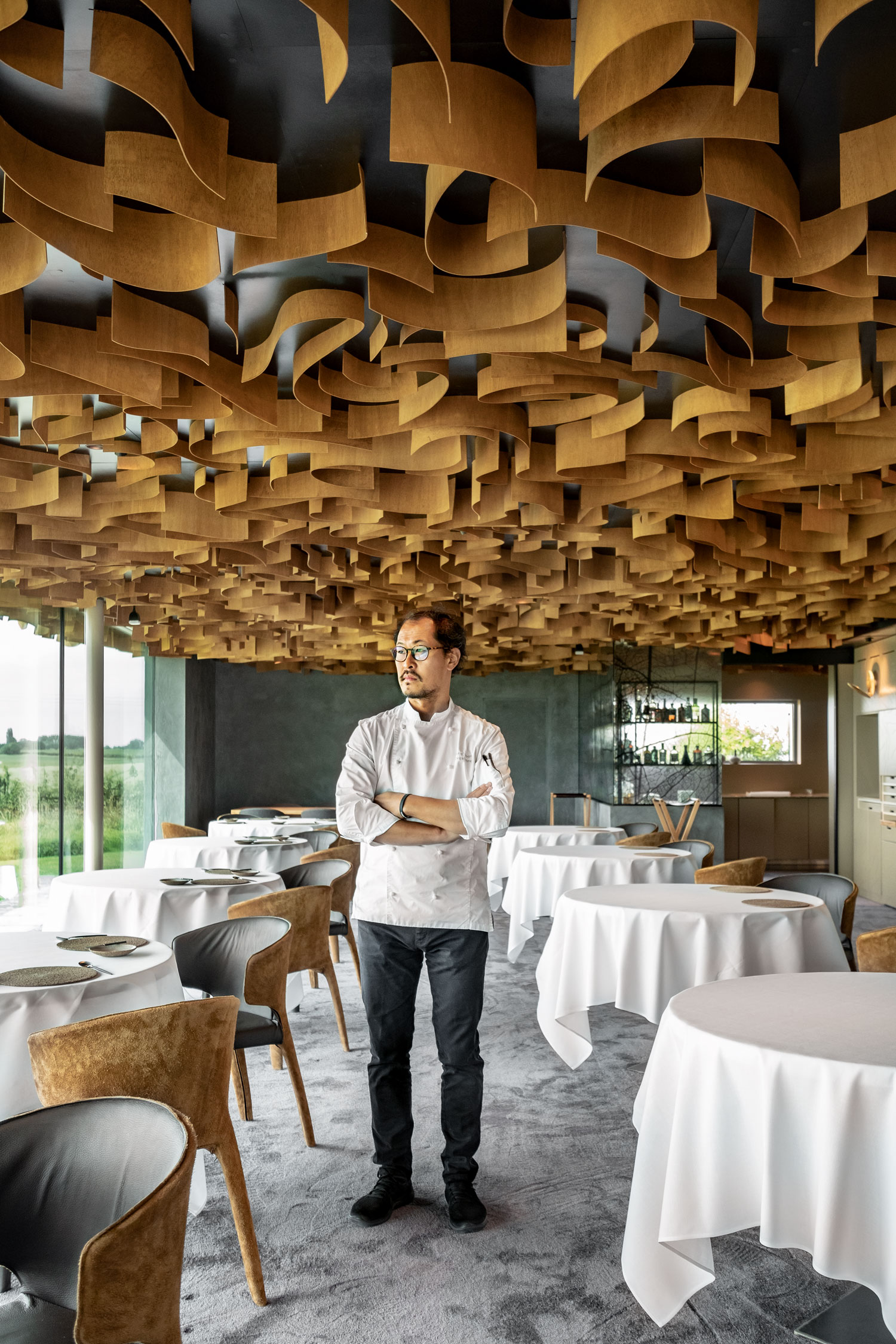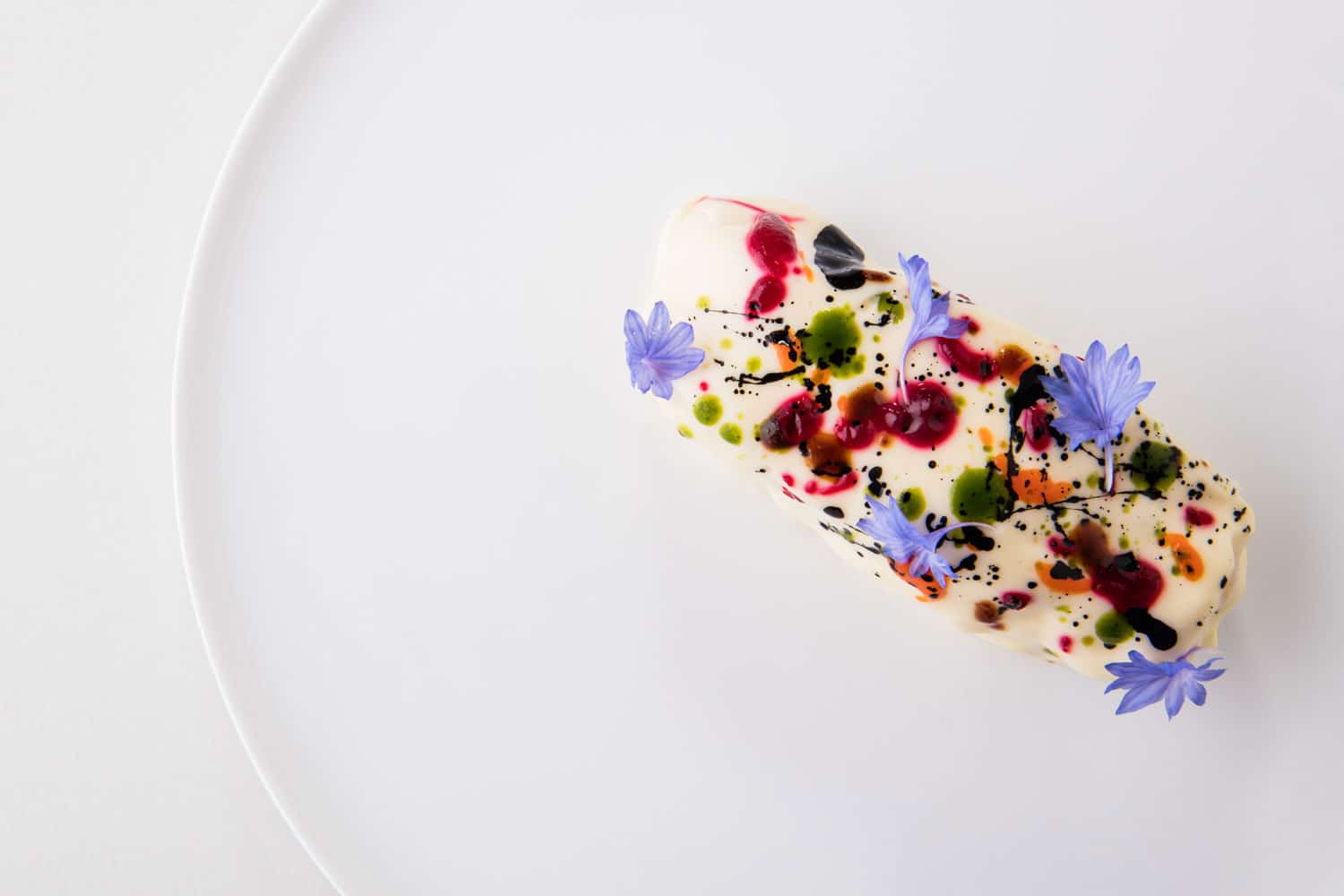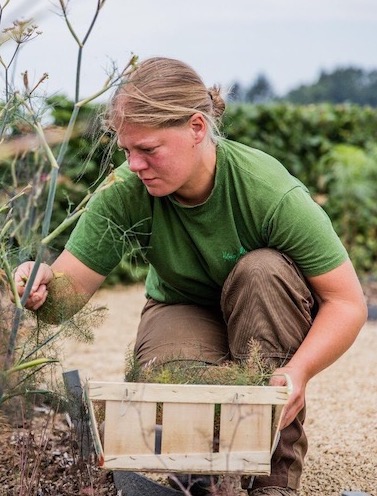ANNE BROGNIET
« Everything revolves around nature »
For the second episode of its Prominent Women programme, the organisation Les Grandes Tables Du Monde met with Anne Brogniet, deputy gardener at restaurant L’air du temps, in Belgium.
As a former student at Académie Royale des Beaux-Arts, she now cultivates – in collaboration with chef Sang Hoon Degeimbre and Benoît Blairvacq, head gardener – a 5-hectare vegetable garden fully dedicated to and governed by nature. Meet a converted gardener, moved by her desire for reconnection and food self-sufficiency.
© Pieter d’Hoop
In the preparation for this interview, you mentioned your career change. What made you turn to this work of gardener?
Above all, I felt the need to reconnect with nature. After my studies, I worked in gardening for three years, but quite quickly, I sought deeper meaning in my work. This is when I transitioned from garden maintenance to gardening. I wanted this activity to bring out a sense of responsibility and learning, with the aim of achieving food autonomy. Of course, this work is very demanding physically: we have our head buried in dirt all day long! It takes stamina and patience to master all the right gestures. But you quickly realise it is a healthy fatigue, and that when you dedicate your energy to nature, it gives it back a hundred fold! Radish for instance isn’t only a root: when it blooms, it produces a pod, which is edible and unveils new flavours.
« A completely original gustative journey. You can also see plenty of similarities between Man and nature, and therefore what binds us together. »
Anne Brogniet’s career
- 1999-2004 : Académie Royale des Beaux-Arts, Brussels.
- 2004-2007 : Garden maintenance work.
- 2014 : Training in market gardening, internship at L’air du temps and encounter with Benoît Blairvacq.
- 2015 : Part-time job at L’air du temps, turning into a full-time job in 2017.

More and more chefs rely on vegetable gardens, and gardeners are becoming key stakeholders in restaurants. Why do you think this role has become so important today?
Gardening has always been important, in fact it is at the foundation of everything, but the industrial era and its simplified production methods have erased the essential meaning of this profession! Today, it is easy to forget that there is a man or a woman behind every vegetable crate, that nature operates according to its own laws, its own time. For me, gardening helps us re-appropriate all of this, regain our rights over our environment, our food and its origins.
It’s something that some chefs, like Sang, have clearly understood; they think nature in the same way as I’m describing. There is a strong will to bring back ethics in our plates.
Of course, this inevitably comes with constraints: when you work land as it is, with people as they are, results are never guaranteed, so you must be able to adapt and re-invent yourself constantly. But the final result is incredibly rich.
There is clearly a very close relationship between the kitchen and the garden, how do you learn to work in harmony? Who dictates what?
At L’air du temps, we all agree on the fact that nature is our master, and everything revolves around it. Our chef Sang knows the garden as well as we do, he often strolls around, tasting everything; our role is mostly that of an intermediary. Of course, in some cases, when we have surplus, or when we taste something we enjoy, we happily suggest it to the kitchen. So it goes both ways.
In fact, there is an initial alchemy between nature, climate and the gardener. And the chef, with his creations, elevates and promotes this relationship.
Doesn’t the work of gardener also represent a heritage issue? By passing down your gestures and know-how, don’t you think you actively take part in preserving and promoting Belgian vegetable and culinary legacy?
When the sun is out, with our new room opened onto the garden, customers are growing increasingly curious. They come to meet us, question us, it’s really nice to exchange with and show them forgotten produces such as nettle for instance. That’s where the notion of heritage comes in: we’re not inventing anything, we simply dig, cultivate and share. We show them there is a vegetable world outside standards, and with a little luck, they will be able to use this knowledge and spread this philosophy.
Transmission also plays a key role in our team. For instance, Benoît possesses a strong interpretation of gastronomy, a genius spark of madness that he brings to us! Conversely, I provide structure and steadiness. There is complementarity, an alchemy that we strive to pass on to our colleagues.

Gardening is still perceived as a “male” profession. Do you feel you have been faced with more obstacles / have not been heard as much being a woman?
Yes, there are times when being a woman has led to comments. When I was doing garden maintenance for instance, some clients were reluctant to pay me the same they would a man, because they thought I wasn’t capable of providing the same service…
However, I have the feeling we are growing more and more numerous in the field of gardening, probably because we have a different relationship to nature, to Mother Earth. Of course, there will always be machos that tell you to “just turn the soil”, but if you look closer, you realise ploughing (i.e. the act of turning the soil with great strength, for instance with backhoes) isn’t good for the soil. So it’s very important to bring finesse, understanding and empathy to the task, rather than brutal force. It is a matter of alchemy, just like there is mutual dependency for plants, there is mutual dependency for humans: we must get to know and cultivate ourselves, and promote this complementarity.
What does the future of your trade looks like?
Personally, I still have so much to learn here, particularly on the link between the kitchen and my raw work in the garden. I still have a long way to go. As for the trade, and the restaurant, I really hope more chefs will put ethics back into the plate, because this holds tremendous educational value. Another very important thing that goes along with the renewed interest for gardening is consumer education. Without it, our trade will remain a thankless task for independents, with the issue of prices, availability and simplicity expected by clients.
« As for the long term, I dream of a micro farm in every street, where everyone connects and shares the workload, experiences and discoveries. »


